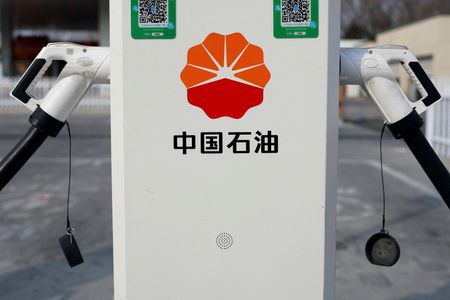By Sam Li and Chen Aizhu
(Reuters) -State-owned major PetroChina plans to permanently shut 19 ageing refining and chemical units as part of Beijing’s campaign to curb overcapacity and boost profitability, according to analysts.
The world’s second-largest oil consumer is facing a faster-than-expected peak in fuel demand due to rapid electrification of its transportation fleet and its petrochemical sector is plagued by excess capacity and poor margins.
PetroChina, the country’s second‑largest refiner after Sinopec, will retire one refining and chemical unit that failed to meet safety standards and gradually phase out another 18 units that have operated for more than two decades, according to analysts who attended the company’s earnings call last week.
A company spokesperson confirmed the phase-out program, but did not provide details.
These are part of the 309 old units that the state major is evaluating to streamline its downstream business. Remaining facilities are considered of low risk and will largely continue to operate.
PetroChina is also assessing 43 crude distillation units, including three with capacities smaller than 40,000 barrels per day, analysts said.
Two of these three CDUs will be retained in its portfolio as they process heavy crude oil into lubricants, a niche product that has a higher value than transportation fuels like gasoline and diesel, the company official added.
Meanwhile, PetroChina is pivoting towards higher-value petrochemicals, such as materials used in electric vehicles and solar stations, and it aims to join the world’s top league of chemical companies by 2035, analysts said.
Earlier this year, PetroChina shut the 410,000-bpd refinery operated by Dalian Petrochemical in northeast China, part of a long-mooted project to replace it with a smaller facility at a new site.
In a similar move, top refiner Sinopec Corp said in August it will step up the elimination of inefficient, small refining units and control the pace and scale of chemicals investment.
Weaker refiners were put on notice by Beijing in 2023 when it vowed to weed out plants smaller than 40,000 barrels per day under a national refining capacity cap of 20 million bpd by 2025. Beijing reinforced the effort in September in a work plan calling for upgrading and modernizing ageing plants.
(Reporting by Sam Li in Beijing and Chen Aizhu in Singapore; Editing by Florence Tan and Alexandra Hudson)











